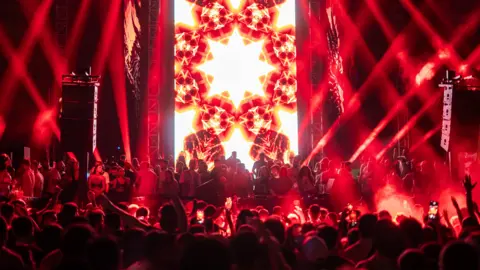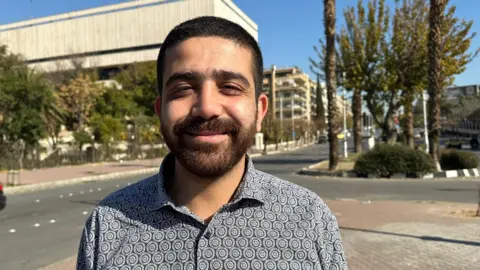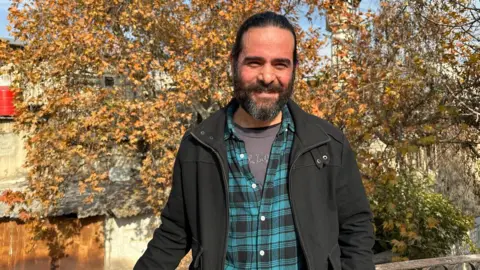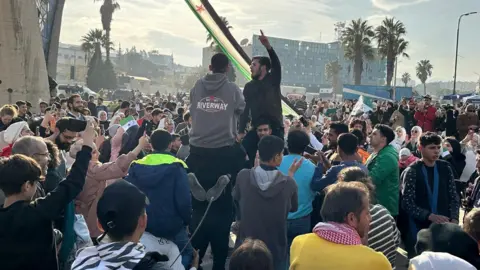 Siin Experience
Siin ExperienceAmid the fight for a new Syria, the country's musicians are warily eyeing Islamist rebel leaders and hoping to build on hard-won gains during nearly 14 years of civil war.
The conflict gave energy and focus to a burgeoning heavy metal scene.
As the fighting subsided, a thriving electronic music and dance performance industry rose from the ashes, leading to a resurgence of Syrian nightlife.
Today, its members are preparing to approach a government led by Hayat Tahrir al-Sham, or HTS — a group with roots in al-Qaeda and the Islamic State. HTS said it broke away from its extremist past years ago.
“We have to be organized before we go to their house because they are so organized,” said DJ and musician Maher Green. “We're ready to talk to them with logic. We're ready to talk to them with a real proposition.”
Electronic music organizers found a way to talk to security services working for the former president, Green said.
“They didn’t understand the gathering of 50 boys and girls and their dancing being so ridiculous,” he said. “We have developed a relationship with them over the years so that everything happens in a positive and peaceful manner.”

The Assad regime was less tolerant of heavy metal rockers who created underground bands in the late 1990s and early 2000s.
They saw it as a subversive Western subculture linked to Satanism.
“I went to the intelligence services maybe three times, just because I was selling this kind of music,” said Nael al-Hadidi, a music store owner. “They made me sign papers saying I wouldn’t do it again.”
The focus shifted when the brutal suppression of Syria's pro-democratic revolution sparked a bloody civil war.
“Before the war, even if you had long hair, if you wore black T-shirts, metal dance T-shirts, security stopped you. They suspected you were satanic or something,” al-Hadidi said.
“After the war started, they were too busy to dig that way. They were more afraid of political issues.”
This opened space for the emergence of a vibrant heavy metal scene, the subject of a documentary by Monzer Darwish called Syrian Metal Is War.
The war may have energized metal bands, but it ultimately led to a mass exodus of musicians who felt the country no longer offered a future.
“Ninety percent of my friends now live in Europe, the Netherlands and Germany,” al-Hadidi said, shaking his head.
Wajd Khair is a musician who remained, but he stopped music in 2011 when the killings began.
“It seemed like all the lyrics I wrote didn't express what really happened, no words could express what was happening at the time,” he told me.

Last year, Khair finally began performing and recording again. He now wonders what Islamist leaders mean for creative freedom.
“We need to be bolder,” he said when asked if he would keep a low profile until the situation becomes clearer.
“We need to be heard. We need to let everyone know that we are here. We exist. It's not just the Islamic Front and the Islamic State here. I don't think keeping a low profile under these circumstances be good to anyone.” “.
Khair was encouraged by the pragmatism demonstrated in the days following the rebel takeover. “The indicators are that we're going to find a better place, hopefully,” he said.
But as he spoke, word got out that HTS had closed the Opera House. “It’s not a good sign” if it’s true, Khair exclaimed.
We rushed to the scene only to be told by outside officials that it was a false alarm and that the venerable institution would open a week after the rebel victory along with other public buildings.
The HTS certainly promises to respect rights and freedoms. He seems sensitive to the cosmopolitan culture of Damascus. State television began broadcasting Islamic chants last week, but removed it in less than 24 hours when social media erupted in protests.

On the square in front of the Opera, Safana Bakleh tried to perform revolutionary songs with the choir she directs. Joined by enthusiastic young people, she handed them her drum and let them sing and chant.
“It may not be an easy path,” she said. “Maybe we will have new obstacles, but we have had corruption, dictatorship, secret police. We still have a lot of hope for the future… because we have a very, very large group of people. who are the opposition and the artists and actors, the musicians and composers and the future of Syria.
But they do not want to trade political authoritarianism for religious fundamentalism, al-Hadidi said.
“I hope HTS keeps its words about freedom, because we don't want to be another Afghanistan or another country run by a specific party or leaders who force you to (follow) certain rules.”
Determined to be part of Syria's future, Green said it was important for the arts community to act quickly.
“It doesn't seem like in the first week of liberating Syria, (HTS) is willing to look at the cultural aspect. They have a lot of problems, they're interested in the economy, they are seeking to form a new government,” he added. he said.
“We're trying to organize before they start getting interested in the culture. To get there first, (and we have to be) united in our opinions.”
Like others here, Green experimented with mixing traditional Arabic music with electronic beats.
The culture of Islamist rebels “is religious songs and that’s it,” he said.
“It's a bit backwards for us. We were here in Syria before the war, and inside during the war, (when) we experienced so much. We evolved so much. We have so many cultures mixed.”
The Syrian music scene has come back to life and even thrived during the civil war. Today she is faced with a new, unexpected ordeal.
#Syrias #musicians #await #future #HTS #rule
